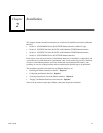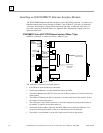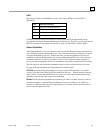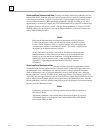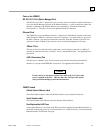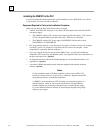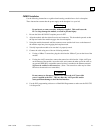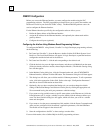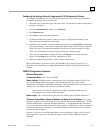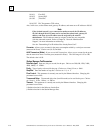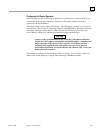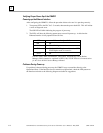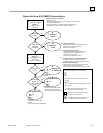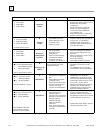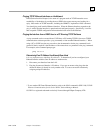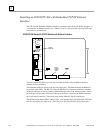
GFK-1541B Chapter 2 Installation 2-9
2
Configuring the Interface Using the Logicmaster 90-30 Configuration Software
To configure the CMM321, access the I/O Configuration rack screen in the Logicmaster 90-30
Configuration Package, and do the following:
1.
Move the cursor to the desired rack and slot location. The slot may be either unconfigured or
previously configured.
2.
Press the Communications softkey, i.e., Comm (F6).
3.
Press Ethernet (F2).
4.
Press Enter to select the Ethernet Interface.
5.
Configure the Ethernet parameters. Refer to the topic “Configuration Parameters” that
follows for more information on these fields.
6.
Optionally, after you have assigned the Ethernet parameters, press Page Down to display the
serial port parameters. You can then change the default settings of the serial ports (optional).
Refer to the topic “Configuration Parameters” that follows for more information on these
fields. We recommend leaving the serial port parameters at default settings.
7.
After you have completed the configuration, press the Escape key to return to the rack
display. Press Escape again to save the configuration to disk.
8.
Store the configuration to the PLC so these settings can take effect.
Refer to GFK-0466,
Logicmaster 90 Series 90-30/20/Micro Programming Software User’s
Manual
for more information on configuring the Ethernet Interface using Logicmaster 90-30
software.
CMM321 Configuration Parameters
Ethernet Parameters
Configuration Mode:
This is fixed as TCP/IP.
Status Address:
The Status address is the location of the LAN Interface Status (LIS) bits (16
bits) and the Channel Status bits (64 bits). The Channel Status bits are always located
immediately following the LAN Interface Status bits. The Status address must be assigned to %I
memory only. The default value is the next available %I address.
Note: Do not use the 80-bits assigned to the LIS bits and Channel Status bits for
other purposes or your data will be overwritten.
Status Length:
This is fixed at 80 bits (the sum of the LIS bits and the Channel Status bits).
IP Address, Subnet Mask, Gateway IP Address, and Name Server IP Address:
These values
should be assigned by the person in charge of your network (the network administrator). TCP/IP
network administrators are familiar with these parameters. It is important that these parameters
are correct, otherwise the Ethernet Interface may be unable to communicate on the network and/or
network operation may be corrupted. It is especially important that each node on the network is
assigned a
unique
IP address.
However, if you have no network administrator and are configuring a simple,
isolated
network
with no gateways, you can use the following range of values for the assignment of local IP
addresses:



